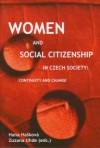While several social movements have contributed to social change in Europe during the last four decades, the goal of FEMCIT is to investigate the role of women’s movements in these transformative processes. FEMCIT will explore the relationship between the changing forms and practices of gendered citizenship in a multicultural Europe, and the demands and practices which have emerged from contemporary women’s movements. We will study how different and changing notions and practices of citizenship relate to gender issues in Europe’s multicultural context, and explores their implications for policies.
FEMCIT sees citizenship as rights and responsibilities, routes to political access, economic participation as well as feelings and practices of social and cultural belonging, and will address all of these aspects of citizenship. FEMCIT understand the promotion of full citizenship as involving both redistributive and recognitional policies and interventions. Women’s full citizenship requires policies and interventions which address both redistribution and recognition - the redistribution of material, economic and political resources, and the cultural and social transformation of gender itself (Fraser, 1997). Citizenship will be conceptualized and researched in this IP as encompassing the gender-relevant dimensions of the relations between individuals and the institutions of national and EU governance – political, social and economic - that may differentially interact with women’s and men’s participation and engagement in political and civil life. The concept of “citizenship” will be operationalised in terms of the following inter-related dimensions, integrating multicultural issues into all of them:
1) Political citizenship (democratic participation/representation)
2) Social citizenship (family policy, child care)
3) Economic citizenship (work, access to and equality in employment)
4) Ethnic and religious citizenship (minority/majority feminism & racism, gender equality and religion)
5) Bodily and sexual citizenship (control over the body (reproductive rights) and sexuality (sexual violence)
6) Intimate citizenship (new family formations and transformations of intimate life)
Main coordinator: Tone Hellesund, University of Bergen
Coordinator of Czech research team: Hana Hašková, Institute of Sociology, Academy of Sciences of the Czech Republic
See www.femcit.org
To download click on the picture.
Distribution:
Press and Publications Department
Jilska 1, 110 00 Prague 1
tel. 222 221 761
email: prodej@soc.cas.cz
Publikace vydané v rámci projektu (celkem 4, zobrazeno 1 - 4)
Problematika umělých potratů není v současné době v České republice často otevírána – snad proto, že k legalizaci interrupcí došlo v této zemi poměrně brzy (již v roce 1957), či proto, že počet interrupcí nyní dosahuje historického minima. Málo se ale ví o tom, co tuto první legalizaci provázelo, jakým způsobem byly interrupce v období komunizmu chápány a regulovány a jak tento historický vývoj ovlivnil současný status-quo v této oblasti.
Kritická pozornost, kterou feministické badatelky věnovaly konceptu občanství, zásadním způsobem přispěla k současnému chápání tohoto pojmu a proměně politické imaginace, která jej doprovází.
Autorky zkoumají institucionální kontext, ideologie a praktiky, které utvářely občanství žen z odlišných socioekonomických, etnických a národnostních skupin v české společnosti od 40. let 20. st. Problematizují statický popis genderových vztahů v socialistických společnostech Evropy. Poukazují také na kontinuitu diskursů, praktik a institucí před a po roce 1989, čímž dokládají složitost kulturních a institucionálních změn navzdory podstatné proměně společenského a ekonomického systému.
Autorky argumentují, že uznání péče a poskytovatelů péče vyžaduje změnu paradigmatu občanství, zaměřeného na placenou práci a ideál nezávislého jedince. Překážky k dosažení genderové spravedlnosti identifikují za pomoci analýzy sociální organizace péče o děti, jako paradigmatického příkladu genderových, etnických a třídních předsudků a nerovností konstrukce sociálního občanství tak, jak je aplikováno ve většině evropských států.







Facebook
Twitter
Tweets by Sociologicky
Newsletter